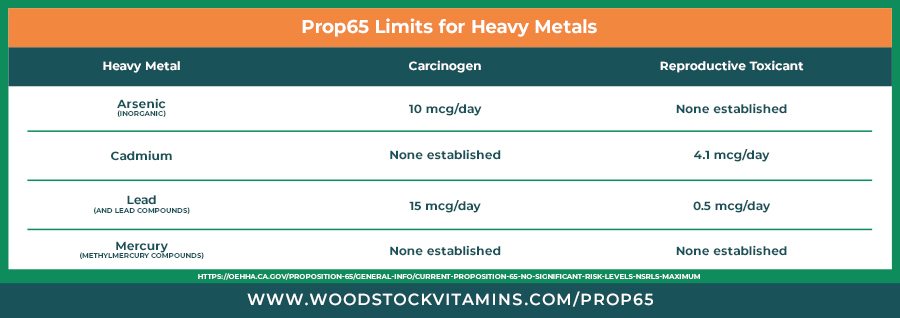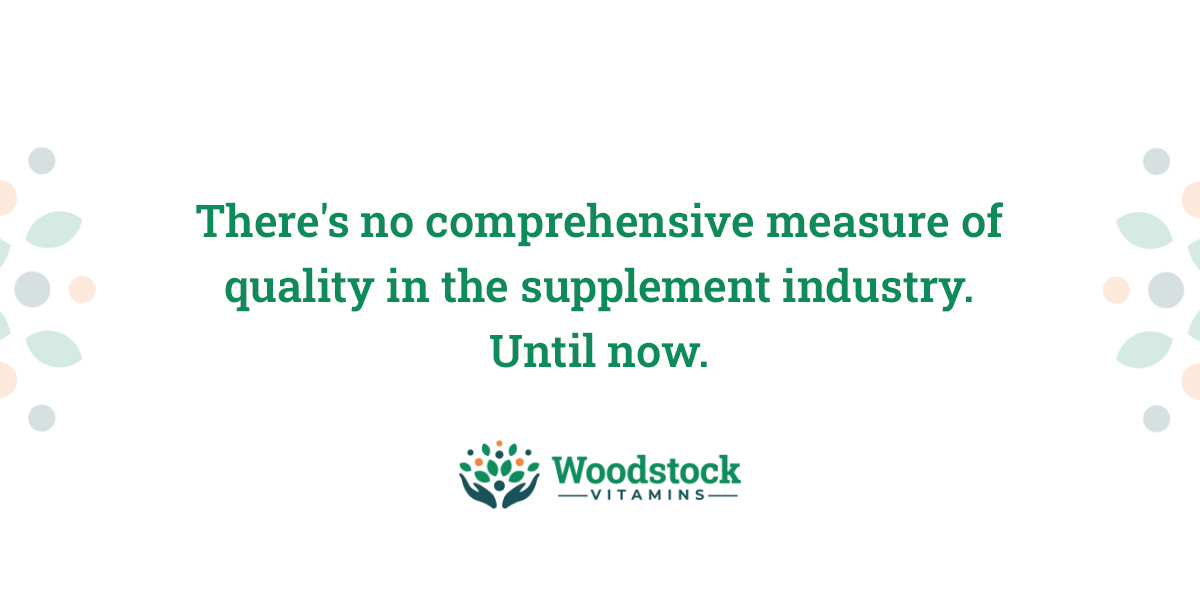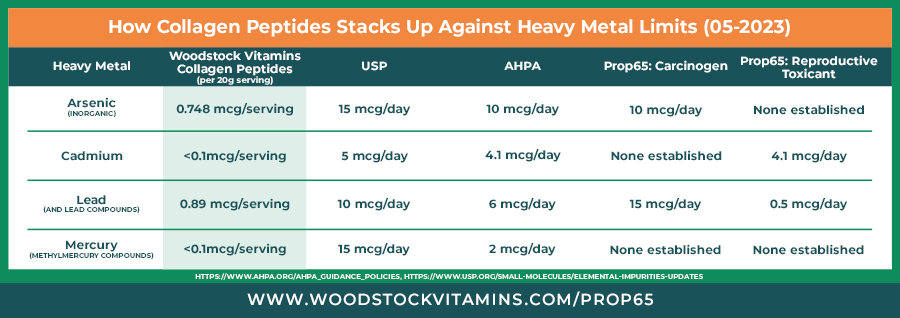
The infamous Prop 65 has had supplement savants quivering their boots since its inception in the late 80s.
Short for the Safe Drinking Water and Toxic Enforcement Act, Prop 65 was passed as a California state law to address growing concerns about gross stuff sneaking into foods, drinks, supplements, cleaning solutions, etc.
The gross stuff is toxins, heavy metals, chemicals that cause cancer or reproductive harm, and the like. Now, on the opposite coast and almost 40 years later, we experience this scenario with relative frequency:
“I looked at your collagen and I saw this warning!”

“I let out an audible gasp, fell off my chair, dropped my coffee, and lost the remote… Things just aren’t right in my home anymore!”
(As the rebels in the wellness industry, we’ve been known to have this effect on people.)
We, the Woodstock Vitamins team, believe unwaveringly in transparency. Our whole thing is making it easier for individuals to achieve their health goals through high-quality supplements and even higher-quality education.
But choosing the right supplements requires a solid understanding of labels — what matters, what doesn’t, what’s fact, what’s marketing fiction, and so on.
So we asked Woodstock Vitamins founder and practicing holistic pharmacist of 20 years, Dr. Neal Smoller, for the run-down on the California law. Keep reading to learn from the wise-cracking Wellness Wizard about the good, the bad, and the ugly of Prop 65.
And, of course, why it’s quite alright to use our collagen peptides despite that ghastly warning…
Proposition 65 — one of the many controversial components of California’s legislative landscape.
We like to think of this humble law as the state’s guardian angel who means well but is easily spooked. The proposition requires all manufacturers selling in the Golden State to alert consumers to the potential dangers lurking in their everyday products.
So, in 1986, Prop 65 set in motion two things: a new convention for labeling practices in California, and a new standard for acceptable levels of carcinogenic components.
The Prop 65 limits for heavy metals in supplements, for example, are as follows:

In its most shining form, the goal of Prop 65 is simply to make sure shoppers in Cali are informed and making empowered purchases.
In practice, however, the overwhelming amount of information made available by Prop 65 has caveats that have garnered criticism. One being that the limits to toxin exposure are in amount per day — neither amount per serving nor cumulative exposure are factored in.
That, and the fact that these standards are comparatively aggressive. (Key word being comparatively.)

Alongside the standards set by the United States Pharmacopeia (USP), a government organization, and the trade organization called American Herbal Products Association (AHPA), Prop 65’s decrees don’t seem so strict!
Except for lead — Prop 65 has a lead risk level that is 12-20 times lower than what other groups have set. Is that an issue?
In our industry-informed and health-forward opinion, no. There’s nothing wrong with wanting less exposure to heavy metals, especially during pregnancy!
But, when it comes to critiquing Prop 65, there are a few aspects of the Haterade upon which we will sip.
Prop 65 provides unparalleled transparency for consumers.
Ingredient and compound quality information should be accessible to all humans who eat, drink, breathe, or otherwise ingest these products — no ifs, ands, or buts.
It’s important to understand what is going into your body, especially if you’re building up the foundation of your wellness.
Prop 65 requires a notice, not transparency.
Wait, what? Are we contradicting ourselves? Very well then — we contain multivitamins and multitudes.
Prop 65 does alert consumers to the potential dangers hidden within, but it doesn’t actually offer the opportunity to build a true, apples-to-apples comparison of products or services. To do that, we’d need to see significantly more detail on those labels about how much of which compounds are detected.
Is it 10x the established safe harbor levels for lead? Is it slightly above the standard for cadmium exposure?
Without a Criminal Minds-level investigation into each product, we’ll never know.
The inundation of Prop 65 notices has numbed us.
For folks in California especially, the flood of identical labels slapped on everything from diesel engine exhaust to Starbucks Refreshers has, unsurprisingly, led to widespread desensitization.
For the rest of us outside of the Golden State, Prop 65 labels land in one of two ways:
The other ugly part? There are health and wellness brands out there that don’t give two hoots about violating the statutes of Prop 65. By creating special labels for sales in California and truncated labels for sales in other states, these ne’er-do-wells pirate profits from reputable companies all the time.
“Your collagen has a Prop 65 label, but theirs doesn’t — Woodstock Vitamins collagen must have higher levels of heavy metals!”
Yeah, that, or some supplement manufacturers aren’t playing by the rules.
Yes, definitely.
As counterintuitive as it may seem, supplements with a Prop 65 label might actually be safer to take than those without. That label, while pesky at times, means the manufacturer has quality at the forefront of their production process.
But do your own vetting — as much as we’d like a black-and-white answer, we rarely get one in the wellness world.
Some great companies have bad products; some bad companies have great reputations. Even bad companies can have a Prop 65 label on a product that’s safe, too! All these things can be true at once.

With vast swaths of gray areas, label lies, and no comprehensive measure of quality in the wellness industry though — how does a health-conscious hero find supplements that are rigorously tested for purity and quality?
Our best answer is… You have to hunt them down.
Look for verifiable transparency and unique quality markers that go above and beyond industry-laid standards. Here at Woodstock Vitamins, that looks like our Supplement Quality Standard, created by Dr. Neal.
Learn More: Quantifying Quality | Dr. Neal Smoller
We don’t mean to toot our own horns, but our Supplement Quality Standard functions as both a framework for consumers to judge quality and a benchmark to push industry standards to higher, safer, and healthier levels.
YES!
We’re not exclaiming because we’re excited about heavy metals, we’re exclaiming because we’re committed to keeping it real — even if it means contradicting every marketing tactic in the playbook.
Here’s the skinny: All beef-based collagen powders will have levels of heavy metals that necessitate a Prop 65 label.
Our collagen in particular is one of the cleanest options for modern consumers, but what really sets it apart is that we’re constantly improving our supplements and formulas.
Case in point: Our current collagen has a lower heavy metal amount than our last!
When Dr. Neal has time to develop the next set — in between educating the masses and making waves in the wellness industry — you can bet your buttons it’ll be better than the current version, too.
It’s one thing to say our collagen is one of the best on the market, and it’s another to prove it. So let’s get real, real transparent with our current lot of protein-packed peptides.
The image below is cut and pasted directly from a lab analysis conducted just a few weeks ago.
As requested by Dr. Neal, this is the second analysis of the finished product, and the third analysis all together if you include the one provided by the raw material supplier.

But before you frantically scroll back to the Prop 65 or USP safe levels graphs above, keep in mind that PPB is not the same as micrograms per day (mcg).
Some supplement manufacturers and wellness companies will bank on the fact that most consumers won’t understand the numbers and acronyms littering the graphs provided. That’s not the case here.
Instead, we’re going to translate the above analysis into real-world numbers. We know that what matters is how much of a heavy metal you’re being exposed to with each dose — that’s how you’ll be able to calculate your daily exposure.
Here’s how those converted numbers look plugged into the previous tables for easy comparison:

Bottom line: Our collagen peptides are adorned with a Prop 65 label solely because the lead content of one serving is slightly higher than the ultra-aggressive reproductive toxicant level set by California.
Essentially, you could eat a full 6 servings of Woodstock Vitamins collagen peptides before you bump up against the considerably meticulous AHPA guidelines for heavy metals.
Please don’t do that, though.
Feeling panicked about the heavy metals that may or may not be accumulating in your body? You’re not alone!
One of the exclamations we hear most often goes to the tune of: “Oh crap, there are daily limits?! How do I know if I’m going over?”
The first step is to not take more than 5 servings a day of our collagen peptides. Pretty easy, actually.
The second step is to take a good, long look at your supplement cabinet because there’s a reason Dr. Neal has long promoted moderation in, well, everything! There are dangers inherent to taking too many supplements.
One that is rarely thought of is the total exposure to contaminants — naturally occurring or otherwise — over time.
You can (and probably should) evaluate the types of foods you eat and the products you ingest to determine what your real exposure is. This requires 3 things:
But wait, let’s wind it back a little bit. How did all these heavy metals get into your supplements in the first place? Have foods, supplements, tap water, etc., always been this toxic?
Yes and no.
Heavy metals are natural elements — they’re a part of our world just as much as the bees and wildflowers we cherish so much this time of year. Because of this, or perhaps in spite of it, no one is immune to heavy metal exposure and accumulation.
At the same time, though, most exposure to heavy metals results from human-centric endeavors — mining, industrial production like coal-burning power plants and petroleum combustion, agricultural activities, and so on.
Sure, a volcanic eruption can crank up heavy metals exposure levels, but mostly, this is happening because we’ve torched the planet.
From the 1950s onward, we humans seemed to think, “Hey, our backyards and lakes are a great place to put all this toxic waste we’ve been creating!”
As a result, we have acid rain, pollution, and increased heavy metal contamination in basically everything we eat or put in our bodies.
It bears repeating that being radically transparent could make people avoid our products.
“That Neal guy’s got lead in his product! Run away!!!!”
But we’re willing to risk it because even the most scrupulous of research deep-dives into different collagen options won’t yield accurate results for consumers.
Here’s why:
A. There are products that are collagen in name only.
B. Plus, Prop 65 is just one piece of the puzzle.
As consumers, we need to get a lot better at math, research, and data analysis to truly understand what we’re putting into our bodies.
But, if you ask us, it shouldn’t be that difficult.
So we’re willing to share the nitty-gritty details about our collagen peptides and various products, in the hopes that our small acts of rebellion will begin to turn the tides of the supplements industry.
Luckily, our team is led by a purity pit bull — voraciously working towards elevated standards and education in the industry and beyond. Hence the Supplement Quality Standards that other manufacturers might call overkill.
Because, when it comes to your health and well-being, we don’t think anything is overkill.
Click around to learn more about the Woodstock Vitamins standard and Dr. Neal’s holistic approach to wellness, or hop on a Counterside Consult to discuss the intricacies of your supplement strategy — Prop 65 labels and all.

First 5
Shop
Peek behind the curtain of supplement industry misinformation and enjoy special promotions, podcast episodes, and our No-BS approach to holistic care, sent weekly.

We built the model for finding supplements that work for your wellness, your wallet, and the world. Learn More
Customer Service
Shop
Peek behind the curtain of supplement industry misinformation and enjoy special promotions, podcast episodes, and our No-BS approach to holistic care, sent weekly.

We built the model for finding supplements that work for your wellness, your wallet, and the world. Learn More
These statements have not been evaluated by the Food and Drug Administration. This product is not intended to diagnose, treat, cure or prevent any disease.
Use only as directed. Consult your healthcare provider before using supplements or providing supplements to children under the age of 18. The information provided hereinis intended for your general knowledge only and is not intended to be, nor is it, medical advice or a substitute for medical advice. If you have or suspect you have a specific medical condition or disease, please consult your healthcare provider.